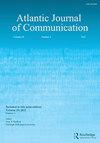The nature of FoMO: trait and state fear-of-missing-out and their relationships to entertainment television consumption
IF 1
Q3 COMMUNICATION
引用次数: 7
Abstract
ABSTRACT Fear-of-missing-out, or FoMO, is the experience of believing that other people are having an enjoyable experience from which one is absent. FoMO has been identified in previous research as a personality trait, rather than a state that can change based on situational factors. This study set out to establish if FoMO can be a state that varies within an individual as experiences change, and to adapt the existing FoMO trait scale into a scale which can be used to measure state FoMO. Within the context of the Game of Thrones finale, results demonstrated that trait and state FoMO are two different factors, whereby increased trait FoMO indicated that a person was more likely to have caught up to new episodes of Game of Thrones, perhaps because of buzz about the show that gave people FoMO. This study also identified some related concepts that both trait and state FoMO predict – such as whether a person had watched Game of Thrones and how early in the series they had begun to watch it. A state FoMO scale for use in future research is proposed.FoMO的本质:特征和状态的错过恐惧及其与娱乐电视消费的关系
错失恐惧症(fear of missing out,简称FoMO)是一种感觉,认为别人正在经历一段自己缺席的愉快经历。在之前的研究中,FoMO被认为是一种人格特质,而不是一种可以根据情境因素而改变的状态。本研究旨在确定FoMO是否可以作为一种随着个人经历的变化而变化的状态,并将现有的FoMO特征量表调整为可用于测量FoMO状态的量表。在《权力的游戏》大结局的背景下,结果表明FoMO特征和状态是两个不同的因素,FoMO特征的增加表明一个人更有可能追上《权力的游戏》的新剧集,也许是因为关于这部剧的讨论给了人们FoMO。这项研究还发现了FoMO特征和状态预测的一些相关概念,比如一个人是否看过《权力的游戏》,以及他们开始看这部剧的时间有多早。提出了一种状态FoMO量表,用于未来的研究。
本文章由计算机程序翻译,如有差异,请以英文原文为准。
求助全文
约1分钟内获得全文
求助全文

 求助内容:
求助内容: 应助结果提醒方式:
应助结果提醒方式:


